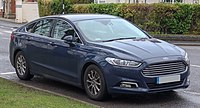Ford Mondeo
| Ford Mondeo | |
|---|---|
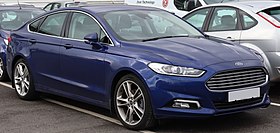 | |
| Overview | |
| Manufacturer | Ford |
| Also called | Ford Contour (North America) Mercury Mystique (North America) Ford Fusion (Americas) |
| Production | 1993[1]–present |
| Assembly | Belgium: Genk (1992–2013) Russia: Vsevolozhsk (2009–2015) Spain: Ford Valencia (2014–present) |
| Body and chassis | |
| Class | Large family car (D) |
| Body style | |
| Layout | FF layout (1993–present) Transverse front engine, front-wheel-drive (2000 – 2007) AWD layout (1993–2000, 2007–present) |
| Related | LINCOLN Continental Ford Taurus (seventh generation) LINCOLN MKZ |
| Chronology | |
| Predecessor | Ford Sierra Ford Scorpio |
The Ford Mondeo is a large family car manufactured by Ford since 1993. The first Ford declared a "world car", the Mondeo was intended to consolidate several Ford model lines worldwide (the European Ford Sierra, the Ford Telstar in Asia and Australia, and the Ford Tempo/Mercury Topaz of North America). The Mondeo nameplate is derived from Latin mundus, meaning "world".[2]
For its first two generations, the Ford Mondeo was produced using the Ford CDW27 platform, with the third generation shifting to the EUCD platform. The fourth (current) generation uses the Ford CD4 platform (the first car to do so).
Versions[edit]
As of 2018, Ford has produced five versions of the Ford Mondeo across four generations. In 1996, the first-generation Mondeo underwent an extensive redesign, becoming the Mk II.
In North America, the Mk I and Mk II Mondeo was produced and marketed as the Ford Contour and Mercury Mystique from 1995 to 2000. The 1999-2002 Mercury Cougar is a rebodied three-door hatchback variant of the Mk II, sold as the Ford Cougar in export markets.
The Mk V Ford Mondeo is the second Mondeo designed as a "world car", as it adopts the Ford Fusion nameplate in the Americas, Middle East, and South Korea. In January 2016, Ford showcased a facelift in USA for model year 2017. As of June 2018, it was unknown whether this facelift would be brought to Europe and the Mondeo branded version. The current Mondeo is still the pre-facelift of the Ford Fusion. Ford Fusions have a conventional trunk lid, distinguished from the world market Mondeo which has a large hatchback, including the "trunk lid" and rear glass; the cars are virtually identical in side view.
| Generation (with photo) | Ford platform | Introduction | Model years |
|---|---|---|---|
| First generation (Mk1) | Ford CDW27
|
1992 | 1993-1996 |
| First generation facelift (Mk2 - The first-generation Mondeo was facelifted in 1996, and although it shared most of the mechanical components of the pre-facelift version, it is widely referred to as the Mk II, such is the difference in appearance.) |
1996 | 1996-2000 | |
| Second generation (Mk3) | 2000 | 2000-2007 | |
| Third generation (Mk4) | Ford EUCD (CD345) | 2006 | 2007-2010 |
| Third generation facelift (Mk4) | 2010 | 2010-2014 | |
| Fourth generation (Mk5) | Ford CD4 (CD391) | 2012 | 2014-present |
Motorsport[edit]

The Mondeo competed in the British Touring Car Championship (BTCC) between 1993 and 2000. The cars, prepared by former series champion Andy Rouse, did not enter the 1993 season until the eighth round, at Pembrey, in Wales. Rouse and Paul Radisich were the drivers in the Mondeo's first season. Radisich went on to win the FIA World Touring Car Cup in both 1993 and 1994 driving a Mondeo.
Ford ran a factory-sponsored team, called Ford Team Mondeo, for eight seasons. Andy Rouse Engineering ran the cars from 1993 to 1995, when West Surrey Racing ran the works team from 1996 to 1998, with Prodrive taking over beginning 1999.
In 2000, the team expanded from two cars to three when drivers Alain Menu and Anthony Reid were joined by 1998 series champion Rickard Rydell, recruited from the disbanded Volvo team. The team dominated the season of 2000, finishing 1–2–3 (Menu–Reid–Rydell) in the drivers' standings and winning the manufacturers' championship by 104 points.
A complete overhaul of the BTCC following the season of 2000 had the supertouring regulations scrapped as the series moved towards less expensive, but slower race cars. Ford withdrew from BTCC competition prior to 2001.
The touring cars, after their withdrawal, went on sale to the public and are now in the hands of other drivers. Two of the 2000 series Mondeos have been spotted in the BRSCC series of LMA Euro saloons; drivers known to own them at present are Bernard Hogarth and Alvin Powell.
The Mk I and Mk II Mondeo have followed many other previous Ford models into the world of banger racing in the United Kingdom, and with plenty of older cars being available for very little money, the Mondeo is now a popular and relatively easy car to race. The Zetec engines are converted to run off a carb set up[clarification needed] and the Mondeo bodyshell is fairly tough, but they are proving rather rigid, with many drivers getting injured in high-speed impacts. Mondeos are proving more popular than the Sierra and Mk III Granada.
In Argentina, the Mondeo is one of several cars to compete in the local Top Race racing category; its body is handcrafted in reinforced fiberglass. The Mondeo is so far the most successful car in the category, with three championship titles in the TRV6 class and two championship titles in the Top Race series (formerly Top Race Junior).
The winning drivers in the TRV6 class were Omar Martínez (2006), José María López (2009), and Guido Falaschi (Copa América 2010) with the Mondeo II (based on the MkIII Mondeo), and in the TR Junior category, the championship was won by Gonzalo Perlo in 2008 and Humberto Krujoski in 2010. In 2009, the Mondeo III (based on the MkIV Mondeo) bodystyle was approved and presented as an option within the category; however, the Mondeo II bodywork is still being used.
Similarly, in the United States, the Fusion/Mondeo Mk 5 bodywork began use for the sixth-generation body in the NASCAR Sprint Cup Series starting in 2013, replacing the current Mazda6-based Fusion.
Awards[edit]
- 1993 What Car? Car of the Year
- 1994 Semperit Irish Car of the Year
- 1994 European Car of the Year
- 1997 Top 10: Most Reliable Cars made in Britain.
- 1998 Best Selling Family Car in Britain.
- 2001 What Car? Car of the Year
- 2001 Top Gear Car of The Year
- 2005 Awarded "Excellent" (Euro NCAP)
- 2006 What Car? Best Used Family Car
- 2007 Auto Express Car of the Year (Auto Express quoted the Mondeo is: "Ford's finest ever car")
- 2007 Auto Express Best Family Car[3]
- 2007 Fifth Gear: Best Family Newcomer
- 2007 Top Gear Car of the Year (Joint COTY, Subaru Legacy Outback)
- 2007 RACV: Best Mid Size Car Over $28,000
- 2007 Drive Car of the Year: Best Medium Car[4]
- 2008 Semperit Irish Car of the Year
- 2008 What Car? Best Estate Car
- 2008 What Car? Best Family Car
- 2008 Motor Trend: Top 10 Car
- 2008 Car and Driver: 10 Best Car
- 2008 Car News Magazine (Taiwan): Best Domestic Large Sedan
- 2008 Sina: Best Driving Performance Car
- 2008 Drive Car of the Year: Best Medium Car[5]
- 2008 The Caravan Club: Tow Car of the Year (Mondeo 2.5t Estate)
- 2008 Auto Express Best Family Car[6]
- 2009 What Car? Best Estate Car
- 2009 What Car? Best Family Car
- 2009 New Zealand Automobile Association: Best Medium Car
- 2010 Drive Car of the Year: Best Medium Car[7]
- 2011 What Car? Best Estate Car
- 2011 What Car? Best Family Car
- 2012 What Car? Best Estate Car
- 2012 What Car? Best Family Car
- 2012 Now Magazine: "Most Attractive Car for a Man To Drive"[8]
- 2013 What Car? Best Estate Car[9]
- 2013 What Car? Best Family Car
- 2016 Continental Irish Car of the Year
See also[edit]
- Mondeo Man, stereotypical figure in the 1990s England
References[edit]
- ^ Lester A. Digman (1997). Strategic management: cases. DAME Publications. ISBN 9780873936194. ISBN 0873936191.
- ^ "Mondeo". Interbrand. Archived from the original on February 9, 2008.
- ^ "Ford Mondeo". Auto Express. July 5, 2007.
- ^ Jaedene Hudson. "DCOTY 2007: Best Medium Car - The verdict". Drive.com.au. Archived from the original on November 9, 2012. Retrieved November 29, 2007.
- ^ Jaedene Hudson. "DCOTY 2008: Best Medium Car - The verdict". Drive.com.au. Archived from the original on November 9, 2012. Retrieved November 27, 2008.
- ^ "Best Family Car". Auto Express. September 1, 2008.
- ^ Cameron McGavin. "Drive Car of the Year: Medium Car". Drive.com.au. Archived from the original on November 27, 2010. Retrieved November 25, 2010.
- ^ "So this is what Mario Falcone's NO sex face looks like". Now Magazine. May 10, 2012. Retrieved June 9, 2012.
- ^ "2013 ECOTY: Ford Mondeo Estate". What Car?. January 9, 2013. Archived from the original on January 15, 2013. Retrieved January 9, 2013.
External links[edit]
| Wikimedia Commons has media related to Ford Mondeo. |
- Ford Mondeo UK - official website
- Ford Mondeo Australia - official website
- Ford Mondeo Sport Club - biggest fan club at Taiwan
| show |
|---|
| show Ford Australia automobile timeline, 1980s–present
|
|---|
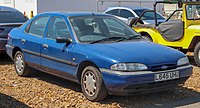
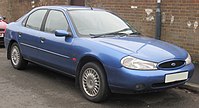

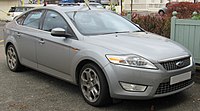
_LX_hatchback_(2015-07-14)_01.jpg)
